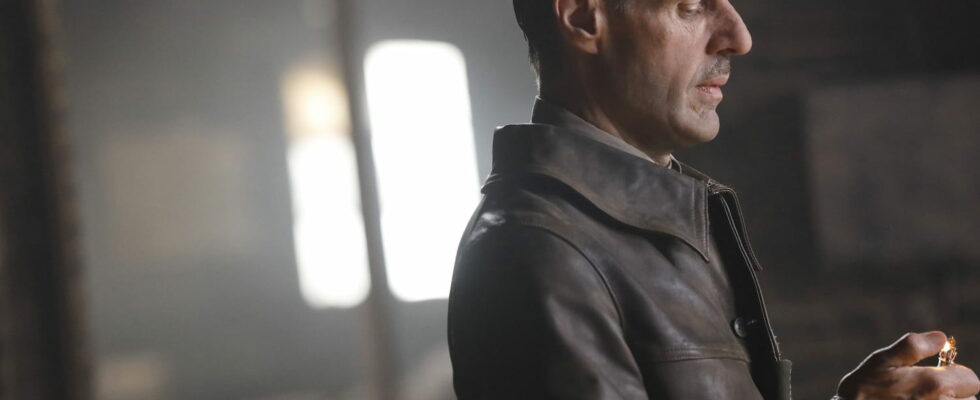The film “De Gaulle”, with Lambert Wilson in the title role and released in 2020, tells how the future President of the Republic delivered the appeal of June 18, 1940.
De Gaulle is the first biopic dedicated to the historical figure of the first president of the Fifth Republic. To avoid telling the general’s story linearly, director Gabriel Bomin chose to count the weeks leading up to theappeal of June 18, 1940inspired by the British film The speech of a king. The feature film remains faithful to historical reality as we know it, but allows itself some small anachronisms (notably a plane with three white stripes whose sign did not exist before 1944) and liberties with reality. Thus, the Charles de Gaulle Foundation and his family were not consulted (but were informed of the project), so as not to make the film “hagiographic”. As the personality of Yvonne de Gaulle is less well known, there are also more liberties taken with this character.
So that De Gaulle is as faithful as possible to historical reality, director Gabriel Bomin went through the biographies, history books, the more personal stories like those of his son, the letters that Charles and Yvonne exchanged daily. This served as a fundamental basis for writing the film’s script, which combines historical moments and scenes from intimate life. “Afterwards, within all that, we have to make choices, and above all we have to invest in fictional spaces and bring them to life with honesty and resemblance,” he conceded in an interview with Linternaute at the time of the film’s release. Certain moments were thus imagined: if Anne, the couple’s daughter, had Down syndrome, the director and the screenwriter imagined the scene where Yvonne De Gaulle takes the (existing) photo of her husband with her daughter on his arms at the beach .
For his part, Lambert Wilson also admitted to Linternaute that he “did not try to imitate [Charles de Gaulle]”. “I find that this is not a very interesting exercise. The perfect imitation is entertaining for a while, but you can miss the point. I find that it is more important to give a sensation, a vibration of the character and to make people understand what moves him.” However, and the actor himself admits, the work of incarnation was more complicated to shoot scenes of intimate life as well as scenes where the character is in his traditional military costume well known to the public: “We have to make decisions where there is no information at all, other than the letters, their correspondence, what that their son described the family situation and the atmosphere that reigned there,…etc. […] We have responsibilities, if not towards family members, we are still obliged not to do anything. And at the same time you have to show imagination, invent their body language.”
film profile
A historical French figure of the 20th century, Charles de Gaulle had never before been entitled to an adaptation of his life for the cinema. Only TV films had tried the exercise. This is now done with De Gaulle, released in cinemas on March 4, 2020. Worn by Lambert Wilson and Isabelle Carréthe feature film looks back on the few weeks which led to the general’s departure for London and the call of June 18, 1940.
Synopsis – In June 1940, Marshal Pétain wanted to stop the armed struggle against Germany. The chairman of the board Paul Reynaud and the General de Gaulle want to continue the fight but are not heard. The armisty is signed. De Gaulle decides to go to London to seek help from Prime Minister Winston Churchill and thus continue the conflict which has become global. For her part, Yvonne, his wife, sees the enemy advancing dangerously and therefore decides to take the road with their children. In England, the general has no news from his family and is preparing to give a speech that will change the course of his life and of History…
Critics were relatively satisfied with De Gaulle at the time of its release, in March 2020. This “four-star biopic” for Culturebox, which considers the challenge “met with panache”, while La Croix hails “a moving film about dark hours from the spring of 1940 which offers a sentimental vision of a strategist alone against all”. The bet is also successful for Télé-Loisirs, which welcomes “an ambitious biopic produced like a political thriller and providing real dramatic tension”. Overall, Lambert Wilson’s interpretation is praised by critics, with Les Inrocks deeming him “inhabited” by his character.
However, not everyone is convinced by the emotion of the film. Le Parisien criticizes De Gaulle in particular for “the flatness of the historical narrative, which is too classic”. For this media, the feature film “lacks breath” and “De Gaulle does not fit into the history… of cinema”. An opinion shared by the specialized media Première which deplores a “stuck biopic”: “Gabriel Le Bomin confirms the difficulty of making the general a great fictional figure”. De Gaulle should, however, make fans of the genre curious, or those who wish to immerse themselves in this complex period of our history.
